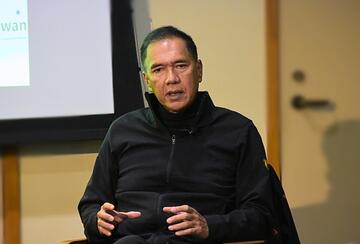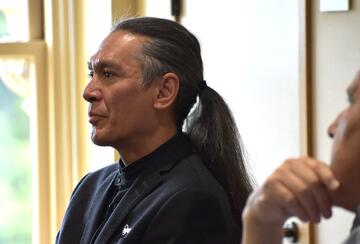Southeast Asia Program at APARC - News
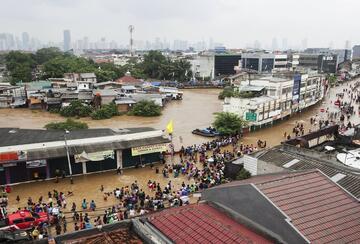
Gavin Shatkin, a Lee Kong Chian NUS-Stanford fellow on Southeast Asia at APARC, argues that prevailing urban development challenges in Jakarta, Metro Manila, and Bangkok stem from Cold War-era political and institutional structures imposed by U.S.-backed authoritarian, anti-communist regimes.
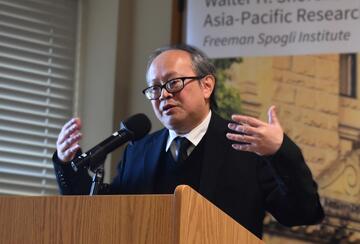
Speaking just one day after deadly clashes between Thailand and Cambodia reignited along their shared border, Thai Ambassador Dr. Suriya Chindawongse joined APARC’s Southeast Asia Program to explain how a fragile truce, shifting U.S. tariffs, emerging semiconductor opportunities, and a surge in online scam syndicates are shaping ASEAN’s future.
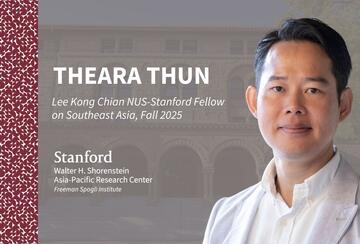
Theara Thun, APARC’s Lee Kong Chian NUS-Stanford Fellow on Southeast Asia, investigates how educational systems emerged in post-Khmer Rouge Cambodia within the broader context of national recovery and development.
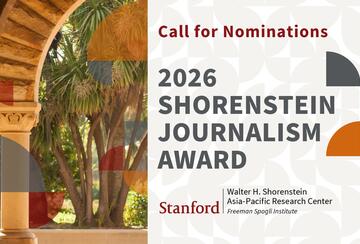
Sponsored by Stanford University’s Shorenstein Asia-Pacific Research Center, the annual award recognizes outstanding journalists and news media outlets for excellence in covering the Asia-Pacific region. News editors, publishers, scholars, and organizations focused on Asia research and analysis are invited to submit nominations for the 2026 award through February 15, 2026.
In his new book, What It Takes: Southeast Asia, Gita Wirjawan examines how Southeast Asia can unlock its untapped potential by leveraging its massive economic and human scale to claim its place on the global stage.
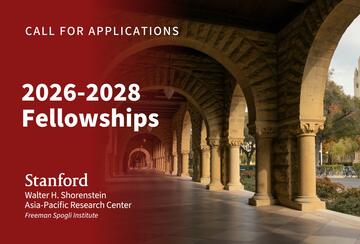
The center offers multiple fellowships in Asian studies to begin in fall quarter 2026. These include a postdoctoral fellowship on political, economic, or social change in the Asia-Pacific region, postdoctoral fellowships focused on Asia health policy and contemporary Japan, postdoctoral fellowships and visiting fellow positions with the Stanford Next Asia Policy Lab, and a visiting fellow position on contemporary Taiwan.
The Center’s new cohort of seven scholars pursues research spanning diverse topics across contemporary Asian studies.
At a fireside chat hosted by APARC's Southeast Asia Program, Kim Aris, the son of Daw Aung San Suu Kyi, called for humanitarian aid to Myanmar, his mother’s release, and freedom for the Burmese people.
At a discussion hosted by APARC’s Southeast Asia Program, Thai politician and democracy advocate Pita Limjaroenrat assessed the challenges facing Thailand and provided a hopeful vision for its future, one that relies on perseverance, strategic electoral victories, and the pursuit of a more just and equitable political system.

Rethinking Racial Formations and Race Relations in Singapore: A Conversation with Alisha Cherian
APARC 2024-25 Predoctoral Fellow Alisha Cherian studies race relations in Southeast Asia, focusing on the lived experience of Indian Singaporeans and their interactions with state-defined racial categories.

Economist Huixia Wang, a visiting scholar at APARC, discusses her research into healthcare economics and the reverberating effects of poor healthcare access on health outcomes across generations.

Sponsored by Stanford University’s Shorenstein Asia-Pacific Research Center, the annual Shoresntein Award promotes excellence in journalism on the Asia-Pacific region and carries a cash prize of US $10,000. The 2025 award will honor an Asian news media outlet or a journalist whose work has primarily appeared in Asian news media. Nomination entries are due by February 15, 2025.

APARC recently hosted two panels to consider what a second Trump presidency might mean for economic, security, and political dynamics across Asia and U.S. relations with Asian nations.

Held at Stanford and hosted by the Shorenstein Asia-Pacific Research Center, the third annual Dialogue convened global leaders, academics, industry experts, and emerging experts to share best practices for advancing Sustainable Development Goal 9 in support of economic growth and human well-being.

Held at Stanford University on October 10-11, 2024, the third annual Trans-Pacific Sustainability Dialogue will unite social science researchers, scientists, policymakers, and emerging leaders from Stanford University and the Asia-Pacific region to accelerate resilient infrastructure, promote inclusive and sustainable industrialization, and foster innovation.

Stanford researchers Gi-Wook Shin and Haley Gordon propose a novel framework for cross-national understanding of human resource development and a roadmap for countries to improve their talent development strategies.

Stanford’s Asia-Pacific Research Center Invites Applications for Fall 2025 Asia Studies Fellowships
The Center offers multiple fellowships for Asia researchers to begin in Autumn quarter 2025. These include postdoctoral fellowships on Asia-focused health policy, contemporary Japan, and the Asia-Pacific region, postdoctoral fellowships and visiting scholar positions with the Stanford Next Asia Policy Lab, a visiting scholar position on contemporary Taiwan, and fellowships for experts on Southeast Asia.
Anthropologist Gerhard Hoffstaedter, APARC's Lee Kong Chian NUS-Stanford Fellow on Southeast Asia, discusses his research into the experiences of refugees in Malaysia and their interactions with international institutions.
The Southeast Asia Program at Shorenstein APARC commemorated its 25th anniversary at the conference “Reconsidering Southeast Asia: Issues and Prospects,” gathering leading scholars to examine current trends affecting Southeast Asia’s present and shaping its future.
The Center’s new cohort of nine scholars pursues research spanning diverse topics across contemporary Asia studies.

Former Australian Foreign Minister Julie Bishop faces an unenviable task in attempting to bring peace to the country.

Shorenstein Postdoctoral Fellow Norman Joshua examines how state-society interactions in Indonesia produced an authoritarian political culture, tracing the implications of the country’s enduring legacy of militarization.

FSI and APARC Senior Fellow Stephen Kotkin joined APARC Visiting Scholar Gita Wirjawan, host of the “Endgame” video podcast, to share his analysis of Russia's invasion of Ukraine, consider the threats posed by autocratic powers, and propose future avenues for the United States to effectively compete with China in a multilateral context.

In a new interview, Southeast Asia Program Director Donald K. Emmerson discusses the history and politics that have shaped great power competition in Southeast Asia and how the intensifying rivalry between China and the United States might affect ASEAN member states.

While a return to the U.S.-Thailand alliance's heyday may seem improbable, patience, persistence, and an acknowledgment of new geopolitical realities can pave the way for a more productive relationship between Washington and Bangkok.


